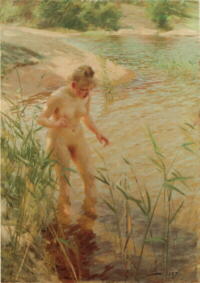Beauty
"There are few among us who can resist the charm and attraction of beauty, though we don't always agree on what beauty is."

"To spiral downwards into a worship of ephemeral beauty at the risk of overlooking its impermanent nature, to become fixated with the outer shell while ignoring what dwells within -- these are errors which betray the intrinsic value of what is beautiful."

"The beauty of youth is a powerful metaphor of the future -- of the continuity of life. We must remain connected to this continuity to remain vital."
To seek beauty in nature is an attempt to reunite ourselves with an existence from which we are often estranged. What makes the snowy landscape, the flower-strewn meadow, or the multi-hued sunset beautiful is the combination of light and color which overwhelms our senses and leaves us speechless. It carries us beyond the buzzing thoughts which crowd our minds and sets us face to face with something grander and more enduring than our evanescent reasoning. And when we look upon those among us we reckon to be beautiful, something similar happens. The balance of features and form speak of something eternal, something human that is in some way undying. We know what has been perceived as "classically" beautiful -- to list whatever attributes the beautiful possess would be tedious if not impossible. But from the times of the ancient Greeks (those great admirers of human beauty) it is the vital and the fit -- in short, those in the prime of life -- who are deemed the beautiful. This may not seem right or just, but it reflects a very human yearning to cling to life. In youth we see life at its outset, stretched out before all with full promise and potential. To look upon the beauty of youth is to partake of this, if only vicariously.
The human body itself does not always inspire delight, even those bodies deemed most unarguably beautiful. There are some who refuse to look upon naked beauty. For them it is turned to an ugly purpose. They may see nudity as a lure towards a life of dissipation and away from what they perceive to be a higher truth. And in some ways they are correct in taking note of the dangers of being seduced by mere appearance. But they often fail to see that such beauty is only an echo of something higher which ever seems beyond the attainment of mortals. To spiral downwards into a worship of ephemeral beauty at the risk of overlooking its impermanent nature, to become fixated with the outer shell while ignoring what dwells within -- these are errors which betray the intrinsic value of what is beautiful.
The naked human body has become something of a fetish object in some quarters of our culture. It is so rarely observed that it is difficult for many people to view nudity with anything less than a hunger for that which they are denied. The most commonly presented form of naked humanity is the young woman in the prime of life -- and to a lesser extent the young man. These images are often of people provocatively displayed, obviously meant to trigger some kind of sexual response. But the sexual feelings which the naked human body arouses are in some way akin to the reaction we feel when we observe anything that is beautiful. We are attracted to beauty and in some way we want to take it all in -- we want to merge with it. We want this vitality to be a part of us and we mistakenly think that by possessing the image or even the person that we have somehow absorbed the life force which draws us closer. The danger of fixation becomes greater when such primal and unquenchable feelings are at the root of it. It is important to look beyond the glamorous and the alluring images which are often the only ones that meet our eyes in the public sphere to break free of this narrow appreciation of beauty.
It is possible to perceive a beauty in the human form that reflects not only the vitality of blossoming life but also the evidence of endurance. The totality of human experience encompasses the range of differences in terms of age and appearance. To see beauty in this variety is to look beyond the reassuring glow of vibrancy which fills the youthful form and appreciate how precious and tenacious life is. As our bodies age -- or as we see the evidence of age in the bodies of those around us -- we begin to sense our limits. This can be a sobering discovery, especially for those of us who haven't learned to face their mortality by looking beyond their own personal existence. We cannot forestall this inevitable process by merely surrounding ourselves with images of youth. And when we resist what we must face, the conflict which results destroys all hope for a fruitful and satisfying life.
It is understandable, though, for us to turn to the classic images of beauty. The beauty of youth is a powerful metaphor of the future -- of the continuity of life. We must remain connected to this continuity to remain vital. The joy which this connection brings about -- which goes beyond the unfortunate superficiality of physical appetites and the jealous need to possess or draw upon this energy -- can only be truly authentic if it is put into context. Seeing beauty we must remember that the form which displays it to us will eventually lose this gift and disappear altogether to be replaced by another. There is a chain of life which joins us to the past and the future. If we can see beauty as an ephemeral reminder of life's continuity rather than something which separates us by becoming the possession of certain fortunate individuals then it can be an attribute of goodness. If the delight we take in the apprehension of the beautiful is translated into a generous sense of joy for the beholders and the beheld that evokes an appreciation of the eternal, we will discover that beauty is more than skin deep